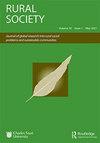Building entrepreneurial literacy among villagers in Indonesia
IF 1.1
Q3 SOCIOLOGY
引用次数: 3
Abstract
ABSTRACT This article presents findings from interviews with Indonesian villagers who limited access to quality education. To minimise this educational disadvantage, a village community of entrepreneurship was designed to help improve villagers’ socio-economic capitals and empower villagers to become entrepreneurs. An exploratory study of this intervention programme was enacted to identify whether this village community of entrepreneurship helped build villagers’ entrepreneurial literacy. Findings showed the village community of entrepreneurship provided villagers with a space for learning entrepreneurship, and the villagers had informal educational opportunities. The villagers also reported that their heightened awareness of entrepreneurship could build their entrepreneurial literacy. It was also found that the programme improved the welfare of rural communities. The article concludes by recommending how this model may be adapted and adopted for rural communities worldwide seeking to create learning communities to improve literacy and reduce poverty.印尼村民创业素养建设
摘要:本文介绍了对印尼村民的采访结果,这些村民在接受优质教育方面受到限制。为了最大限度地减少这种教育劣势,设计了一个乡村创业社区,以帮助提高村民的社会经济资本,并赋予村民成为企业家的权力。对这一干预方案进行了探索性研究,以确定这个乡村创业社区是否有助于培养村民的创业素养。研究结果表明,乡村创业社区为村民提供了学习创业的空间,村民有非正式的教育机会。村民们还报告说,提高他们的创业意识可以培养他们的创业素养。还发现,该方案改善了农村社区的福利。文章最后建议如何将这一模式适用于世界各地的农村社区,以创建学习型社区,提高识字率和减少贫困。
本文章由计算机程序翻译,如有差异,请以英文原文为准。
求助全文
约1分钟内获得全文
求助全文

 求助内容:
求助内容: 应助结果提醒方式:
应助结果提醒方式:


